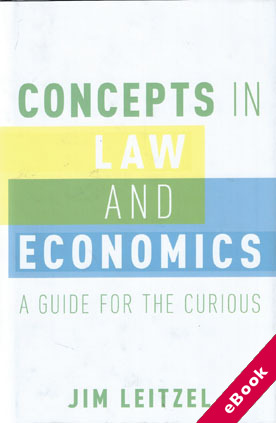We will be closed from 5pm Thursday 17th April for the Easter Bank Holidays, re-opening at 8.30am on Tuesday 22nd April. Any orders placed during this period will be processed when we re-open.

The device(s) you use to access the eBook content must be authorized with an Adobe ID before you download the product otherwise it will fail to register correctly.
For further information see https://www.wildy.com/ebook-formats
Once the order is confirmed an automated e-mail will be sent to you to allow you to download the eBook.
All eBooks are supplied firm sale and cannot be returned. If you believe there is a fault with your eBook then contact us on ebooks@wildy.com and we will help in resolving the issue. This does not affect your statutory rights.
Economic debates about markets and freedom from the late 1940s onwards focused increasingly on how laws and regulation affected economic behavior, and how economics influenced legal decision-making.
By the late 1950s the term "law and economics" came into use to refer to the application of economic analysis to legal problems. The overlap between legal and political systems also led to issues in law and economics being raised in political economy, constitutional economics, and political science.
Concepts in Law and Economics: A Guide for the Curious provides a comprehensive integration of the fields of law and economics. In clear prose, Jim Leitzel challenges traditional approaches to law and economics and uncovers common themes that cut across the two fields, providing readers with a means of integrating their knowledge to examine problems through both a legal and economic lens. This book covers the major methods of law and economics and applies those methods to various issues, including art vandalism, sales of human kidneys, and the ownership of meteorites.
Compact yet comprehensive, this is an ideal introduction to a vast number of concepts and controversies in the fields of law and economics. Economics students, law students, and those with a general interest in the social sciences will find Concepts in Law and Economics an interesting and engaging read, and will emerge with the necessary skills for thinking like a law and economics practitioner.